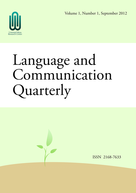


Volume 10 Issues 1-4 (2021-12-31)
Volume 9 Issues 1-4 (2020-12-31)
Volume 8 Issues 1&2 (2019-06-30)
Volume 7 Issues 3&4 (2018-12-31)
Volume 7 Issues 1&2 (2018-06-30)
Volume 6 Issues 3&4 (2017-12-31)
Volume 6 Issues 1&2 (2017-06-30)
Volume 5 Issues 3&4 (2016-12-31)
Volume 5 Issues 1&2 (2016-06-30)
Volume 4 Issues 3&4 (2015-12-31)
Peer assessment in ESL/EFL education is increasingly drawing attention from researchers in the field. Most of them focus on the assessment of ESL/EFL students’ writing. Research on the peer assessment of their speaking, however, is limited. This article is to review the factors affecting the peer assessment of EFL students’ speaking. Specifically, student-related factors (e.g., their oral English proficiency levels, emotions, awareness, and action), rater-related factors (e.g., rater training, rater feedback, assessment criteria, and gender of the rater), and task-related factors (e.g., the complexity of the task, the literature-response task, and the size of the peer group) are reviewed. Implications for the learning and teaching of EFL speaking are discussed.
Gender poetics is the complement of literary feminist criticism which reveals political nature of gender oppression based on deconstructive approach. It is a literary theory which emphasizes gender ideology that is correlated to global cultural ethic on the basis of historical development and reflection of gender culture. The construction of the poetics of gender embodies the inclusiveness, polysemy and ductility of the literary theory as a discipline. In some sense, it calls for the new type of gender relationship, in which everyone is equal with freedom and the aesthetic demand will be disciplined. The ideal goal of gender poetics is “androgyny.” It advocates the constructions of androgynous culture that preserves gender differences and establishment of harmonious and equal gender relations. The characteristic of cross-gender (androgyny) is very obvious for the poetics of gender. One’s gender and value orientation cannot be decided by someone’s physical characteristics. Shakespeare brings androgynous culture into construction of new gender relations. Tang incorporates androgynous philosophical thinking into creation of androgynous characters. Understanding androgyny concept and culture is essential to analysis of views of women and gender views of Tang and Shakespeare. In general, gender poetics reveals playwrights’ pursuit of ideal androgynous human nature and equal gender relations. Women and men in their writing are portrayed as the androgynous figures with the combination of female and male temperament. In gender relationship, female protagonists are created as initiative as male heroes to some extent. They both are either the independent “subject” or “objects”, silent “other” and share gender oppression equally.